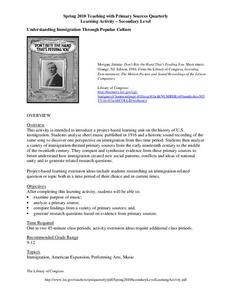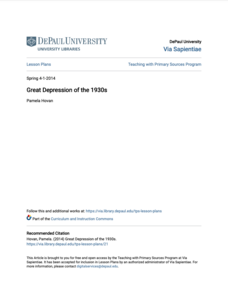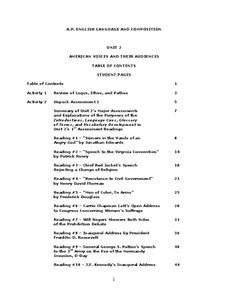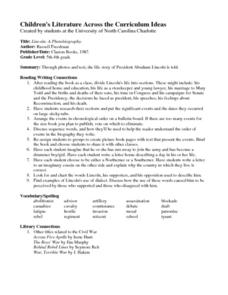Library of Congress
Understanding Immigration Through Popular Culture
Class members are introduced to a project-based learning unit on US immigration with an activity that asks them to analyze sheet music and other primary source materials to uncover issues raised by immigration.
Via Sapientiae at DePaul University
The Great Depression of the 1930s
A 10-lesson unit takes young historians through a study of The Great Depression and life in the 1930s. The crash of the stock market, the Dust Bowl, unemployment, and mass migration west are all addressed through the analysis of primary...
National First Ladies' Library
Rosie the Riveter
Young scholars identify and interpret the power of symbols. Then they research and identify what type of information that they can locate at the Library of Congress website and list what they learned from it in the time allotted....
Curated OER
Library of Congress Learning Page: The Historian's Sources Lesson Overview
Students study techniques for analyzing primary sources. Finally, students apply these techniques to analyze documents about slavery in the United States.
Curated OER
Pay to Play?
Lead your class in a discussion about how they believe money influences politics. After reading "Go Ahead, Try to Stop K Street" from the New York Times, they evaluate the claims in the article about the current lobbyist scandal in...
Curated OER
Oil Crisis: What Would You Do?
The dynamics between the economies and politics of the United States and the Middle East are here to study. Upper graders read and discuss scenarios relating to OPEC and the current oil crisis, then in small groups role-play members of...
Northshore School District
American Voices and Their Audiences
Those new to teaching an AP level language and composition prep course and seasoned veterans will find much to treasure in a unit that is designed to help young language scholars develop the skills they need to analyze the language...
Curated OER
In Their Own Words: Slave Narratives
Learners identify primary sources, explain the strengths and weaknesses of personal accounts in history, and negotiate the Library of Congress Database. They also analyze documents and write a summary that compares and contrasts the...
Curated OER
Westward Expansion: Links to the Past
Learners investigate the impact of Manifest Destiny. For this California history lesson, students conduct research on the settlement of the state between 1849 and 1900. Learners use their findings to create scripts that link primary...
Curated OER
War is Hell
Tenth graders identify a veteran of a foreign war. They use the Veterans History Project website, research on-line interviews for information on interview questions. They research war and graphics using the Library of Congress online...
Facing History and Ourselves
The Political Struggle, 1865-1866
Healing versus justice. The central source of tension following the United States Civil War was between the demands for healing and the demands for justice, the battle between President Andrew Johnson and Congress. A video introduces the...
Facing History and Ourselves
Interracial Democracy
Radical Reconstruction, the 10-year period referred to after Congress passed the Reconstruction Act of 1867, saw the establishment of manhood suffrage, men voting without any racial qualifications. Southern states also rewrote their...
Curated OER
Children's Literature Across the Curriculum Ideas-Lincoln: A Photobiography
Students read Lincoln: A Photobiography by Russell Freedman. They complete a variety of cross-curricular activities surrounding the life of Abraham Lincoln, including, but not limited to, the Civil War. Included are reading, art, math,...
Curated OER
Slavery in the United States: Primary Sources and the Historical Record Lesson
Students analyze primary source documents to determine how life was for slaves. In this slavery lesson, students view online resources from the Library of Congress to analyze and discuss. Students select a final object to analyze and...
C-SPAN
Presidential Veto and Congressional Override
One of the key powers of the executive branch is the president's ability to pass or veto legislation proposed by Congress. Congress, the legislative branch, on the other hand, can override a president's veto. Five film clips show how the...
C-SPAN
The Role of the Executive Branch in Policy Making
Although the president of the United States does not have the power to pass laws, they can propose legislation, veto bills passed by Congress, and issue executive orders that bypass Congress. Six video clips show middle schoolers these...
C-SPAN
Choice Board: Expressed and Implied Powers
Article 1, Section 8 of the United States Constitution expressly lists powers given to Congress. Over the years, lawmakers have expanded the enumerated powers to include powers implied by the list. To better understand the significance...
C-SPAN
Should States Shift to Mail-In Voting during the Coronavirus Pandemic?
With the coronavirus pausing many norms in American society, officials are trying to decide how to safely hold voting in the 2020 presidential election. Using curated video clips, including speeches from Congress, journalists, and...
University of Wisconsin
Analyzing Presidential Campaign Propaganda
Campaign propaganda has evolved from 1952 through the presidential election of 2008. A social studies activity prompts class members to analyze the devices used in ads and political cartoons, noting strategies they believe would work to...
Curated OER
Songs from the Past
Students research songs from the past to learn about historical events. In this music history lesson, students conduct a survey on the Star-Spangled Banner, research the song and history on various websites, and research songs in the...
Curated OER
Creating Dramatic Monologues from The Grapes of Wrath
The characters in The Grapes of Wrath come to life through an activity that asks groups to craft a dramatic monologue for a character in John Steinbeck's National Book Award and Pulitzer Prize winning novel. Writers are...
Curated OER
Retro Sports Card Self Portrait
Young scholars create a "Sports Card Self-Portrait" using the student as model and the sport of their choice as the subject. They use the examples of early baseball cards from the Library of Congress online exhibition "Baseball Cards...
Library of Congress
Determining Point of View: Paul Revere and the Boston Massacre
If you're teaching point of view, this is the lesson for you! First, decipher the writer's point of view from a primary resource, then compare and contrast the primary source with a secondary source to explore the Paul Revere's...
Smithsonian Institution
Conflicting Voices of the Mexican War
Americans wanted to fulfill Manifest Destiny, and this pattern continued with the Mexican War. The resource specifically teaches about the Mexican War through a variety of exercises including a research project, group work, brainstorming...

























